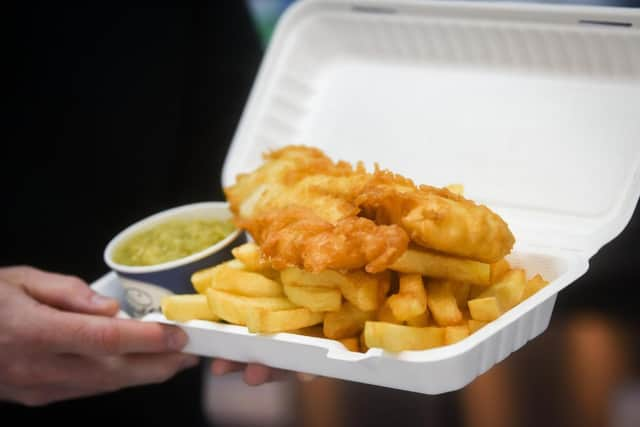Could our chippies now be under threat as Ukraine crisis pushes up costs?
and live on Freeview channel 276
With the soaring cost of the oil used in deep fat fryers and fears about the availability of white fish, the industry is facing a crisis – and the war in Ukraine is a key factor.
The oil cost is rising because Russia and Ukraine are responsible for 50 per cent of the world’s production of sunflower seeds.
Advertisement
Hide AdAdvertisement
Hide AdThere are alternative forms of cooking oil but unfortunately the cost of these are also surging.


And the industry is facing a double whammy because more than 50 per cent of the fish used comes from Russia, and these imports have now been hit by a 35 per cent Government tariff.
That is certain to affect supplies of white fish, as well as the cost.
Concerns were expressed last week that fish and chips could soon cost a tenner for the first time, or result in businesses being forced to lower their quality to survive.
Advertisement
Hide AdAdvertisement
Hide Ad

There are around 10,000 fish and chip shops in the UK, and the industry is well represented across the Fylde coast, with many highly regarded shops from Fleetwood to Lytham.
But Chorley-based Andrew Crook, of the National Federation of Fish Friers, fears that several of the takeaways which have become such a familiar feature of our streets for so long might not survive.
He said: “Sixty per cent of the cod that comes into this country comes from Russia.
“It’s already a premium product, which you’ll see in the supermarkets in priced higher than steak.
Advertisement
Hide AdAdvertisement
Hide Ad“But all the costs are going up and I fear the industry as we know it will be badly affected.
“Certainly, the increased costs of everything might be too much for some of the smaller shops and we might be left with chains and other which perhaps try and keep their overheads low by perhaps compromising rather on quality.”
At one of the most popular chippies in the North Fylde area, Kays Fish and Chips, on Rough Lea Road in Cleveleys, manager Daniel Thorpe said the price of oil he bought had doubled and would have risen by even more if he hadn’t been able to fix it at a contract price.
He said the rising costs of petrol, gas and electric were also putting the squeeze on, but he added: “We offer freshly caught fish seven days a week, luckily from Scotland and Scandinavia rather than Russia, and locally-made pies and local spuds.
Advertisement
Hide AdAdvertisement
Hide Ad"Fortunately we don’t feel the need to lower our quality and that is reflected in a loyal customer base.
"Although the latest price rise was by 80 pence, our regular fish and chips is £6.80 and our sit in price is £8.55, so we are nowhere near to charging a tenner at the moment.
"The rising costs are certainly a concern for our industry, though,”
Added pressure is expected next month when VAT is due to return to 20 per cent from 12.5 per cent.
Advertisement
Hide AdAdvertisement
Hide AdMr Crook , who runs the Skipper’s chippy at Euxton near Chorley and whose family has been in the business in Lancashire for 40 years, said he had also increased the price of fish and chips by 50p to £8.50 at his shop.
He fears a VAT increase would make his business ‘borderline profitable’ and added: “If the worst happens half of them may go’ and said he already feared 3,000 would close over the next five years.
He added: “We have always worked on very narrow margins but now the increases are so severe it is going to be impossible for businesses to absorb.
“We are in unprecedented times where we are seeing high levels of inflation and food inflation is even higher.
Advertisement
Hide AdAdvertisement
Hide Ad“Most of the supplies we use in the fish and chip industry have increased drastically in price and we are expecting this to continue for some considerable time.
“Other products are simply not available, and we have already seen suppliers move away from the sector.”
However, fish and chips – often referred to as Britain’s national dish – has been written off before.
Four years there were warnings that the favourite could disappear from the menu because of climate change, according to new research.
Advertisement
Hide AdAdvertisement
Hide AdScientists said larger marine species – including cod and haddock – faced either being wiped out or shrinking in size as rising temperatures cause a reduction of oxygen in the oceans.
Some of those in the industry are convinced the industry will survive.
Alastair Horobin, who owns the Seniors chain, with eight outlets on the Fylde coast, said: “It’s certainly a very challenging time ahead for all hospitality and my beloved fish and chip industry is in for a rocky road.
“Fish prices soaring, supply poor, frying oil hitting record highs, mushy peas doubled, VAT rising to 20 per cent, utility bills off the charts, staff wages, packaging, petrol to fill up delivery cars and hikes to other taxes make April onwards a very uncertain time.
Advertisement
Hide AdAdvertisement
Hide Ad“But I’m confident the industry will survive this. Fish and chips is our national dish; it’s cherished was never rationed in the war and I believe it’s always going to be enjoyed by all.
“Its a natural product that’s tasty and still so much better value that comparable meals, which as lasagne chips £15 or a Chinese or Indian takeaways with rice and a side dish.
“My fellow friers need to be inventive and confident in our future so portion control, great value for money offers and transparency in cost related challenges I see as key.”
